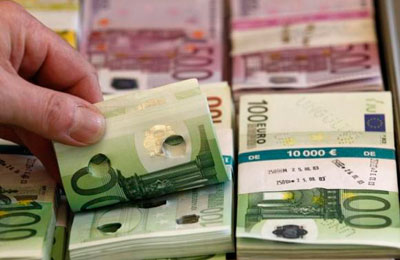
The scheme...start in mid-October for covered bonds
ECB targets bundled-debt market to boost economy
NAPLES, ITALY, October 3, 2014
The European Central Bank (ECB) laid out plans on to buy rebundled packets of debt within weeks to shore up the flagging euro zone economy and its president said the bank would do more if needed.
It was, nonetheless, one of the last arrows in the ECB's quiver before the broad buying of assets known as quantitative easing.
Just months after unveiling a multi-pronged attack to help the economy, with cheap bank loans, lower interest rates and a pledge to buy reparcelled debt, President Mario Draghiinsisted the ECB had been making progress.
"We've done a lot," Draghi told reporters in the southern Italian city of Naples as protesters nearby paraded banners saying: 'Free us from the ECB!'
"Just go back with your memory to the last three years, even four or five years. We've done really a lot to improve the financing conditions. And now, of course, we are waiting," he said, commenting on a long-awaited improvement in lending.
Draghi, speaking after the central bank's governors had decided to keep interest rates unchanged at just 0.05 percent, also urged euro zone countries to keep up with budget targets, just days after France announced a budget that would flout them.
He outlined an ECB programme to buy reparcelled debt known as asset-backed securities as well as covered bonds, secured on solid assets such as property, and raised the prospect of bolstering this market and, in turn, lending.
It is a scheme that will start in mid-October for covered bonds, with other purchases of asset backed securities following before the end of the year. Draghi said the potential 'universe' for the type of debt that the ECB was interested in was up to 1 trillion euros, although ECB buys may not be that high.
The ECB will cast its net widely to include debt from Greece and Cyprus with a credit rating of junk on condition that such countries are under a formal international financial programme.
"We want to be as inclusive as possible, but with prudence," Draghi said, adding that conditions would apply.
The ECB hopes the programme, which will last for at least two years, will spur a market for such credit and support lending to the small- and medium-sized firms that form the backbone of the euro zone economy.
"As all our measures work their way through to the economy they will contribute to a return of inflation rates to levels closer to our aim," Draghi said.
He said the intention was to pump money into the economy by expanding the ECB's balance sheet back to the sort of level it was in early 2012, which would mean adding hundreds of billions of euros
GROWING DOUBTS
There a doubts among market analysts and economists that this can be achieved with purchases of asset backed securities.
A Reuters poll on Monday showed money market traders on average expect the ECB to buy a total of €200 billion of ABS and covered bonds over a year.
A separate scheme to boost lending by offering banks up to €400 billon of cheap four-year loans attracted a disappointing initial take-up last month.
Market expectations that the ECB will launch quantitative easing have shot up in recent months as the bloc teeters on the edge of deflation.
Draghi said the ECB council was unanimous that it would take further steps if it needed to - commonly accepted as code for QE. But that ultimate move remains a difficult one for theECB to take, given stiff internal opposition.
The euro gained against the dollar while euro zone bond yields rose as the ECB chief gave no hints of an imminent sovereign bond buying programme.
Draghi faces opposition on a number of fronts.
Bundesbank chief Jens Weidmann has already voiced doubts about the ABS purchase plan and his predecessor, Axel Weber, who resigned over an earlier ECB bond-buying programme, was strongly opposed.
Underscoring the sensitivity of the issue in Germany, Hans-Werner Sinn, the head of Germany's influential IFO economic research institute, attacked the ECB's new project.
"The ECB will finally be turned into a bail-out authority and a European bad bank," he said.
Asset-backed securities are created by banks pooling mortgages and corporate, auto or credit card loans and selling them to insurers, pension funds or now the ECB.
Covered bonds are similar instruments but the underlying assets are ringfenced so if the bank goes bust, the assets are still there. That makes them safer than ABS.
Draghi has appealed to governments to back the purchase plan with guarantees for some riskier ABS tranches, a step that would add a seal of security to the market and encourage other buyers.
But France and Germany have rejected that.
One thing that has gone the ECB's way is a significant fall in the euro to near two-year lows which should push import prices up and help growth via exports. - Reuters







